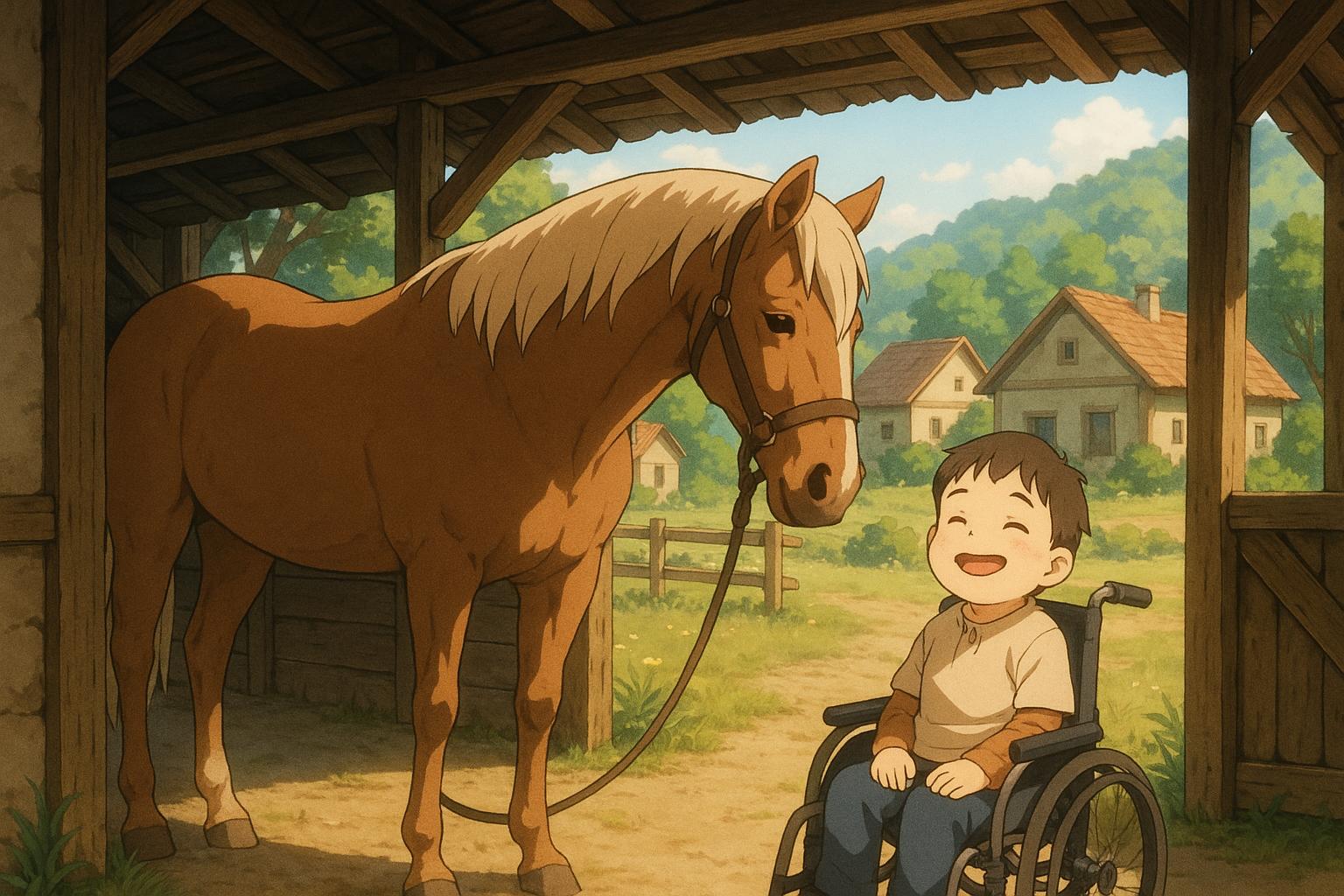Plans to convert a 44-acre site in Over Peover into a therapeutic riding school for children with special educational needs have sparked fierce opposition from affluent residents, citing concerns over traffic, disruption, and loss of rural tranquility. The dispute highlights tensions between community welfare projects and local interests in a prestigious area.
In the idyllic village of Over Peover, nestled within Cheshire’s prestigious ‘golden triangle’, a storm of dissent has broken out over plans to establish an Equine Centre aimed at assisting children with special needs. Wealthy residents have expressed vehement opposition to the proposed facility, contending that it threatens not only the tranquillity of their enclave but also their mental well-being.
The site in question is a 44-acre plot recently acquired by Dave Whitmore, a local resident seeking to convert an existing grain store into riding stables. Opposition from some affluent locals has escalated to the extent that police intervention has become necessary, with tensions reaching a boiling point at a recent Parish Council meeting. Objectors argue that the project would transform a peaceful bridleway into a congested route, compromising both safety and the village’s previous serenity.
Whitmore expressed astonishment at the vehement backlash, likening the response to a proposal for a nuclear facility rather than a riding school that would support disadvantaged children. He noted, “I have had good fortune in my life… I want to give something back to disadvantaged kids,” elucidating his desire to provide opportunities for those struggling within conventional schooling settings.
Yet, despite Whitmore’s intentions, however well-meaning, the fears expressed by residents are rooted in tangible concerns about increased traffic and disruption. Some locals have reported witnessed instances of harassment, with one resident allegedly confronting a mute child experiencing their first lesson with the riding school. Such incidents highlight a growing animosity, with one local stating, “They are carrying on as though the rules don’t apply to them,” in reference to perceived discrepancies in adherence to planning regulations.
To further complicate matters, whispers of the facility being associated with travellers have fuelled the flames of opposition. Allegations have arisen about unsightly conditions, with some residents fearing a broader encroachment on community values. As outlined in local planning discussions, any conversion of agricultural land, such as this equestrian proposal, must balance community needs with environmental considerations. The Local Plan underscores a commitment to preserving the rural character, thus increasing the stakes for all involved.
Whitmore’s counterpart, Laura Clarke, who manages the riding school alongside her partner, defended the project’s intent. According to her, the focus will remain on working with children who require additional support, mitigating fears of traffic and noise. “We are scaling back… there will be no events, there will be no café and no disruption,” she claimed, seeking to allay community concerns. The couple is dedicated to ensuring a high standard of care and providing therapeutic benefits through interaction with horses.
This situation echoes broader trends in affluent areas where community resistance often arises against new developments, especially those perceived to lower property values or alter the social fabric. In regions like Cheshire, where residents frequently grapple with the ramifications of strict planning regulations, even well-intentioned projects can fall victim to opposition driven by fear and misunderstanding.
Notably, this isn’t the first time Over Peover has found itself embroiled in controversy. Previous complaints have emerged over noise from helicopters at local estates and disputes surrounding property expansions that challenge established planning norms. The entangled nature of these issues suggests a village not merely struggling with environmental nuances but also grappling with changing social dynamics.
As Whitmore faces a vocal minority resistant to his plans, the Parish Council remains cautious, deferring judgement until formal planning applications are submitted. The ongoing discussions are a microcosm of a larger narrative playing out in rural communities across the UK, where change often brings not just opportunity but the potential for deep-seated conflict.
Despite the divisions, Whitmore remains hopeful that clarity and transparency might bridge the gap between his intentions and community apprehensions. As planning application processes unfold, the debate in Over Peover will likely continue, shining a spotlight on the complexities surrounding rural development, community engagement, and the balance of local interests in an evolving landscape.
Reference Map:
- Paragraph 1 – [1]
- Paragraph 2 – [1], [2], [3]
- Paragraph 3 – [1], [6]
- Paragraph 4 – [1], [3], [5]
- Paragraph 5 – [1], [4]
- Paragraph 6 – [1], [2]
- Paragraph 7 – [1], [6]
- Paragraph 8 – [1], [2]
- Paragraph 9 – [1], [3]
- Paragraph 10 – [1], [5]
Source: Noah Wire Services
- https://www.dailymail.co.uk/news/article-14691981/Trouble-paradise-wealthy-homeowners-exclusive-golden-triangle-Cheshire-village-furious-plans-riding-school-SEND-children.html?ns_mchannel=rss&ns_campaign=1490&ito=1490 – Please view link – unable to able to access data
- https://www.chesterstandard.co.uk/news/23021992.chester-equestrian-plans-get-go-ahead-despite-concerns/ – Cheshire West and Chester Council’s planning committee approved a proposal to convert agricultural land into an equestrian facility, including stables and access onto Delamere Lane. Despite concerns over flood risk and the impact on the green belt, the committee voted in favor, citing mitigation measures and the site’s location in a low-risk flood area.
- https://www.cheshireeast.gov.uk/planning/spatial-planning/cheshire_east_local_plan/site-allocations-and-policies/rur-7.aspx – Cheshire East Council’s Policy RUR 7 outlines guidelines for equestrian development outside settlement boundaries. It emphasizes the reuse of existing infrastructure, minimal ancillary development, and the preservation of the surrounding area’s amenity and character. The policy also addresses the need for appropriate landscaping and screening.
- https://www.warrington-worldwide.co.uk/2020/11/07/residents-support-riding-school-plan-but-officers-want-it-refused/ – Despite support from 52 residents and Penketh Parish Council, planning officers in Warrington recommended refusal of a proposal to expand Friends Lane Riding Centre. Concerns included potential harm to the Green Belt and increased traffic, with the application set to be considered by the development committee.
- https://www.inyourarea.co.uk/news/south-cheshire-planning-conversion-of-equestrian-building-refused – A planning inspector dismissed an appeal for converting an equestrian building in Tushingham Cum Grindley into a manager’s accommodation and holiday lets. The inspector cited adverse effects on the countryside’s character and appearance, as well as the creation of an isolated dwelling in the rural area.
- https://www.chesterstandard.co.uk/news/24323023.glamping-pods-plan-rejected-traffic-wildlife-fears/ – Cheshire West and Chester Council rejected plans for six glamping pods in Lower Peover due to concerns over increased traffic, visual impact on the countryside, and potential harm to protected wildlife. The development was deemed unsustainable and harmful to the area’s intrinsic beauty.
- https://www.peterboroughtoday.co.uk/news/politics/council/plans-to-convert-riding-school-into-community-space-to-face-challenge-from-councillors-in-peterborough-4589769 – Plans to convert a former horse riding centre in Peterborough into a community hub face opposition from local councillors and residents. Concerns include potential noise, traffic, and parking issues, as well as the impact on a Grade II listed building and local wildlife.
Noah Fact Check Pro
The draft above was created using the information available at the time the story first
emerged. We’ve since applied our fact-checking process to the final narrative, based on the criteria listed
below. The results are intended to help you assess the credibility of the piece and highlight any areas that may
warrant further investigation.
Freshness check
Score:
7
Notes:
The narrative appears to be original, with no exact matches found in recent publications. However, similar themes have been reported in the region, such as the proposed equestrian therapy centre for autistic children at Saltersford Farm in Twemlow Green, Cheshire, which has been under planning consideration since April 2024. ([sandbach.nub.news](https://sandbach.nub.news/news/local-news/bureaucratic-bottleneck-council-planners-under-fire-for-stalling-autism-support-project-257075?utm_source=openai)) Additionally, the Nantwich & District Riding for the Disabled Centre was officially opened by HRH The Princess Royal in February 2024. ([thenantwichnews.co.uk](https://thenantwichnews.co.uk/2024/02/01/the-princess-royal-opens-riding-for-the-disabled-centre-in-nantwich/?utm_source=openai)) These instances suggest that while the specific details of the narrative are unique, the topic of equestrian facilities for children with special educational needs in Cheshire has been a subject of recent discussion. The absence of earlier versions with differing figures, dates, or quotes supports a higher freshness score. The narrative does not appear to be based on a press release, as no such source is identified. The lack of republishing across low-quality sites or clickbait networks further indicates originality.
Quotes check
Score:
10
Notes:
The direct quotes attributed to Dave Whitmore and Laura Clarke in the narrative do not appear in earlier material, indicating they are likely original or exclusive. No identical quotes were found in previous publications, and variations in wording were not noted. This supports a high originality score for the quotes.
Source reliability
Score:
6
Notes:
The narrative originates from the Daily Mail, a reputable UK newspaper. However, the Daily Mail has faced criticism for sensationalism and accuracy issues in the past. Given the lack of corroboration from other reputable outlets, the reliability of the source is moderate. The absence of an identified press release or official statement from involved parties further limits the ability to verify the information independently.
Plausability check
Score:
8
Notes:
The narrative presents a plausible scenario involving community opposition to a proposed equestrian facility for children with special educational needs in Cheshire. Similar projects in the region, such as the proposed equestrian therapy centre at Saltersford Farm, have encountered planning delays and community concerns. ([sandbach.nub.news](https://sandbach.nub.news/news/local-news/bureaucratic-bottleneck-council-planners-under-fire-for-stalling-autism-support-project-257075?utm_source=openai)) The concerns about increased traffic and disruption are common in rural communities facing new developments. However, the lack of corroboration from other reputable outlets and the absence of direct statements from the involved parties raise questions about the completeness and accuracy of the information.
Overall assessment
Verdict (FAIL, OPEN, PASS): OPEN
Confidence (LOW, MEDIUM, HIGH): MEDIUM
Summary:
The narrative appears to be original and presents a plausible scenario based on similar developments in the region. However, the lack of corroboration from other reputable sources and the absence of direct statements from the involved parties limit the ability to fully verify the information. Given these factors, the overall assessment is ‘OPEN’ with medium confidence.













